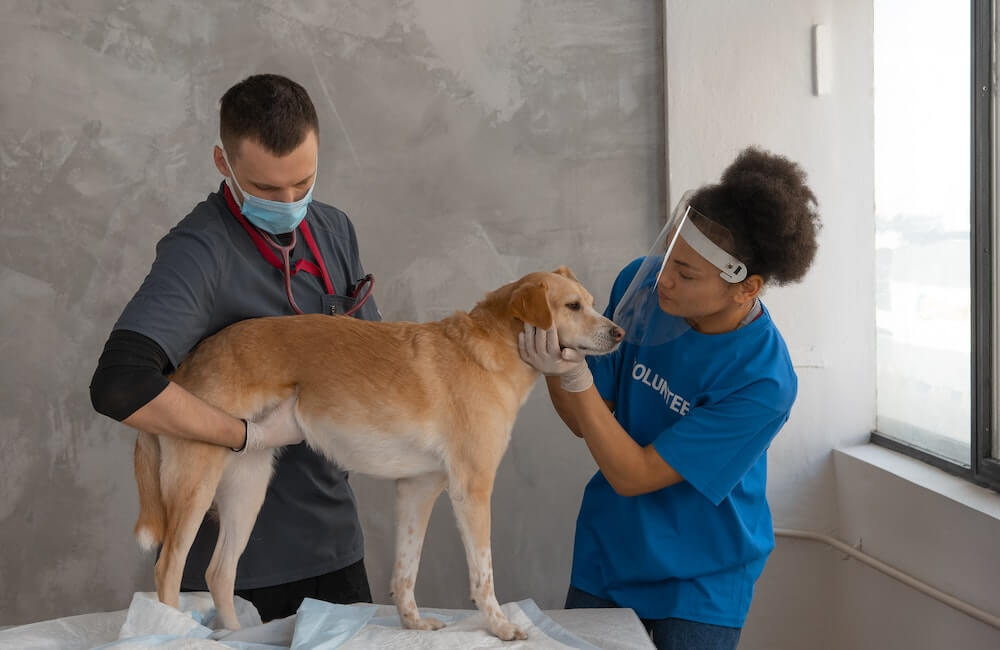The Microbiome Connection: Nurturing Your Dog's Digestive Health
•Posted on July 13 2023
Last updated on December 01 2025

Proper nutrition is essential for a dog's well-being and it's not all about keeping them sated. While taste is important, gut health also plays a critical role in energy, immunity and overall physical and mental wellness. Rather than relying on instincts alone, educating yourself about your dog’s digestive processes can help achieve optimal gut health.
In this article, we'll explore the microbiome connection and provide tips on how to nurture your dog's digestive health for a happy and healthy pup.

What does a healthy digestive system look like for dogs?
Well, it's all about achieving balance. Our gut microbiome, as well as our dogs, is a complex ecosystem that goes through numerous intricate processes to break down and absorb nutrients from food.
At birth, every dog has a unique gut microbiome influenced by genetics. As they grow, the microbiome adapts to their lifestyle and diet. Therefore, being mindful of what we feed them is crucial, as it impacts their long-term gut health.
So, how can you tell if your dog has a healthy gut?
Great nutrient absorption
When good bacteria thrive in your pet's gut, they are more likely to stay healthy and in great shape. The bacteria in the dog's digestive system break down the food your dog eats.
Dogs, especially the more modern breeds, are technically omnivores. Domestication has shaped their digestive system to process both meat and plant-based food. Despite this, specific breeds have different nutritional needs and if these needs are met, they show signs of good digestion such as firm and regular stool.
There is no standard way to define a 'good' stool but look out for any signs that might seem strange. Remember that a firm but moist stool that retains shape indicates a healthy digestive system.
More energy to play around
Once all the nutrients are absorbed, your dog will have more energy to get them through the day. New pet owners must heed: more food portions does not mean more energy available for your pet.
This is why we need to ensure that their pet food offers the best ingredients. Think of a lean, mean food pack with all the right choices and cuts and none of the fat and trimmings. Even with a small portion, having a well-rounded meal will keep your dog filled and energised.
Choose pet food that offers a variety of quality proteins and healthy carbohydrates. Ensure that recipes have been designed to meet the proper nutritional needs of dogs. Include ingredients like salmon, a choice of berries and natural extracts that are a perfect boost for your dog's vitality.
Healthy skin and coat
Having a floofy pup is great news, as it could be a sign that your dog is in excellent health. According to experts, there is a strong link between a dog's gut health and healthy skin and shiny coat. If your dog has dry skin, excessive shedding or itching or a dull coat, it's worth paying attention to. Although a dull coat and dry skin can signal allergies, stress or an underlying health condition, if there are no significant changes in your dog's lifestyle or activity levels, it might be due to their daily food intake.
Pet food with salmon oil, vitamin E and flaxseed enhances a pet's coat with Omega-3 fatty acids and it’s important to choose food that has these ingredients.

Better immune system
Opting for healthy pet food that includes veggies and superfoods is crucial. This will aid in better digestion for your dog and, in turn, boost their immune system. If your dog lacks the right nutrition, it can take some time for you to notice the negative impact it leaves on their gut health and microbiome. Some signs that your dog may be experiencing digestive issues include diarrhoea, vomiting, lethargy and fever, among others.
What is dysbiosis?
Even though the microbiome has many benefits, it is important to remember that not all bacteria are friendly. The balance between good and bad microbes in a healthy dog helps prevent harmful infections. If this balance is upset, harmful microbes can gain the upper hand, causing dysbiosis. This can lead to digestive issues, inflammation and increased susceptibility to illness and disease.
How to know if your dog needs help?
As a pet owner, paying attention to your dog's behaviour, habits and their body is important to determine if their GI system needs help. We suggest you focus on following things:
Pay attention to your dog's stool
One of the most obvious signs of an unhealthy gut is unusual intestine movements. This can include diarrhoea, constipation or blood in your dog's stool. If you notice any changes in your dog's stool, it's important to take note of the colour, consistency and frequency and speak with your veterinarian.
Monitor your dog's eating habits
Another way to detect gut problems is by paying attention to your dog's eating habits. Dogs who lose appetite or are frequently vomiting may have gastrointestinal issues. In contrast, dogs who are constantly hungry or overeating might also have an issue with their gut health.
Check for signs of discomfort
Dogs may exhibit signs of discomfort when their gut health is compromised. This can include excessive gas, bloating, abdominal pain or restlessness. If your dog seems uncomfortable, seeing a vet immediately is best to prevent further damage.
Observe changes in your dog's behaviour
A change in your dog's behaviour can indicate an underlying health issue, including gut problems. For instance, if your typically active dog becomes lethargic, it could be due to a problem with their gut health. If your dog is scratching themselves more than usual, it could be a sign of an allergy caused by a gut imbalance.
Diarrhoea or constipation
Diarrhoea or constipation are common symptoms of poor gut health in dogs. Various factors, including bacterial infections, viruses, parasites or food intolerances can cause diarrhoea. On the other hand, constipation can occur due to dehydration, lack of fibre in the dog diet or certain medications.
Excessive gas
Flatulence can indicate that your dog's gut is out of balance. Dogs with a healthy gut microbial balance produce less gas. When there is an imbalance of gut bacteria, it can lead to excessive gas production and a foul smell.
Vomiting
Vomiting is a common symptom of gastrointestinal problems and can be caused by anything from eating something they shouldn't have, to having an underlying health condition. If your dog vomits more than once or twice, seeing your veterinarian is a must.
Loss of appetite
A loss of appetite can indicate that your dog's digestive system is not functioning properly. This can be due to nausea, gut inflammation or other digestion issues.
Lethargy or lack of energy
Dogs who are lethargic or lack energy may experience anaemia, infections or gastrointestinal issues. These symptoms could be related to your dog's gut health as the gut has a key role in nutrient absorption and energy production.
Itchy skin or poor coat condition
A healthy gut is critical for maintaining healthy skin and coat. Skin itching, rashes, hair loss or a dull coat are often a result of an imbalance of gut microorganisms. The gut absorbs nutrients essential for a shiny and healthy coat.
Why use probiotics for dogs?
Probiotics are beneficial microorganisms that keep the gut in balance. Just like in humans, dogs can also benefit from probiotics as a way to promote good digestive health.
- Improve digestion: Probiotics will help your dog break down food into nutrients and absorb them more easily. This way your pet is able to digest their meals faster and get the necessary nutrients.
- Boost immunity: Probiotics can boost the immune system in your dog. It increases the production of antibodies and other immune cells that fight off harmful pathogens.
- Treat gastrointestinal issues: Probiotics can help with several GI issues, such as diarrhoea, inflammatory bowel syndrome (IBS), colitis and other intestine issues.
- Manage food allergies and intolerances: Probiotics can help manage food allergies and intolerances. They will improve the digestion of certain foods and reduce the inflammatory response.
- Promote overall health: A healthy gut is crucial for overall health and well-being. Probiotics can help with gut microbial balance, which can lead to better nutrient absorption, less inflammation and improved energy levels.
How to choose the best probiotics for dogs?
When choosing the best probiotics for your dog, there are several factors to consider. Here are some tips that can help you make an informed decision:
- Look for strain diversity - When selecting a probiotic supplement, look for one that contains multiple strains of bacteria since each strain has unique properties that can benefit your dog's gut health.
- Check the colony-forming units (CFUs) - CFUs indicate the number of live bacteria in each serving. Look for supplements with at least 1 billion CFUs per serving.
- Check the expiration date - Be sure to check the expiration date to ensure the probiotic supplement is still effective.
- Consider the form of the supplement - Probiotic supplements come in different forms, including powders, capsules, chews and liquids. Choose a form that works best for your dog's needs and preferences.

How to boost your dog's gut health?
It's best to avoid feeding your dog solely processed diets like kibble as they may lack essential nutrients. Instead, incorporate fresh fruits, veggies and proteins to nourish their microbiome while providing essential vitamins and minerals.
You can add natural fibre sources like unsweetened canned pumpkin puree or psyllium husk to ensure your dog's good bacteria thrive.Baked treats may contain constipation-inducing carbs from flour, oats and barley, so swapping biscuits for fresh, tasty treats straight from the refrigerator is a good idea.
Nurturing your dog's digestive health through proper diet and the use of probiotics is crucial to maintaining their overall health and well-being. A healthy gut microbiome not only aids in digestion but supports immune function, reduces inflammation and promotes a positive mood.


